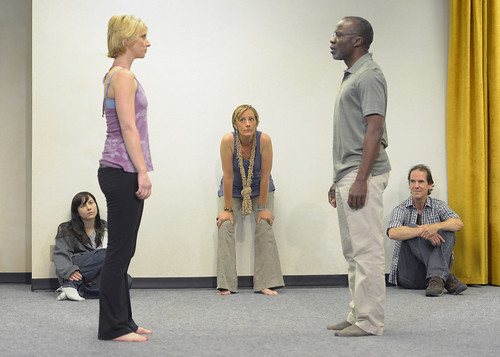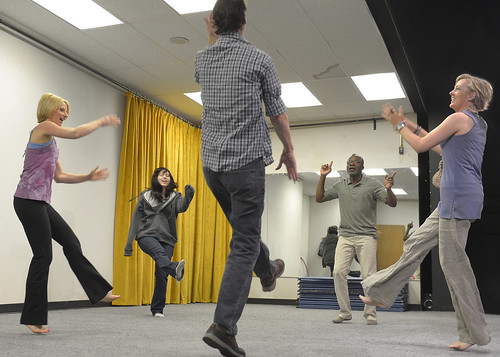Annie Baker's brilliant, reflective Circle Mirror
EXTENDED THROUGH SEPT. 2 Theresa (Arwen Anderson) and James (L. Peter Callender), standing, play an improvisational theater game involving the words “goulash” and “akmok” while Lauren (Marissa Keltie), Marty (Julia Brothers) and Schultz (Robert Parsons) watch in the Bay Area Premiere of Annie Baker’s Circle Mirror Transformation, now playing at Marin Theatre Company, in co-production with Encore Theatre Company. Below: The cast plays a more active theater game involving sounds and movements. Photos by Kevin Berne
Theresa (Arwen Anderson) and James (L. Peter Callender), standing, play an improvisational theater game involving the words “goulash” and “akmok” while Lauren (Marissa Keltie), Marty (Julia Brothers) and Schultz (Robert Parsons) watch in the Bay Area Premiere of Annie Baker’s Circle Mirror Transformation, now playing at Marin Theatre Company, in co-production with Encore Theatre Company. Below: The cast plays a more active theater game involving sounds and movements. Photos by Kevin Berne
At once the antithesis of drama (nothing's happening!) and a complete exposure of the theater's guts and bones, Annie Baker's has a particular genius for creating simplicity of the most complex variety.
Earlier this year, the Aurora Theatre Company got the unofficial Annie Baker Bay Area Festival off to a strong start with her Body Awareness about sexual politics in the small university town of Shirley, Vermont. Then SF Playhouse dazzled with the low-key but brilliant The Aliens, also set in the fictional Shirley, about three unlikely friends, music, death and growing up.
Now Marin Theatre Company in a co-production with Encore Theatre Company conclude the Bay-ker Area Fest with what has become her most popular play, Circle Mirror Transformation. Even more than the previous two Baker plays we've seen so far, this one feels even less like a play and more like an actual experience – something carefully captured in the real world and observed within the artful frame of a proscenium stage.
Verisimilitude is the name of the game here. Everything has to feel real and alive or the play buckles. Happily, under the direction of Kip Fagan, This Circle Mirror is an astutely performed exploration of human connection at its most troublesome and at its most wondrous.
Andrew Boyce's set is the first indication of just how real this is all going to be. He has created a slice-of-life community center rec room (in Shirley, naturally) down to the last water stain in the ceiling tile. You can even see the faint, dirty outline where something used to hang on the wall but has since been removed. Even the fluorescent lighting (skillfully designed by Gabe Maxson) feels exactly right.
The class taking place in this community center is Adult Creative Drama, and that's what the play is: six weeks of once-a-week classes conveyed in two hours with no intermission but lots of short scenes and blackouts.
If you've ever played theater games, you know just how awful and just how thrilling they can be. Making a fool out of yourself, pushing yourself well out of your comfort zone, being forced to interact in fairly intimate ways with virtual strangers – it's all slightly terrifying. But once you get into it, there's a sense of play and excitement and being in the moment that is invaluable.
That's what the four students discover with the help of Marty, their teacher, played by the always-remarkable Julia Brothers. Everybody transforms in some way by the end of the six weeks, and what's extraordinary about Baker's play is the way the audience becomes as involved as the students in the class. The last few weeks of class, when the exercises begin to break into some powerful emotional places, are hilarious and moving. And there's a sense of momentum and monumental conclusion even though it's a little class and the monumental feeling is actually scaled down to human size. To paraphrase Kander and Ebb, it's a quiet thing. There aren't crashing cymbals and tooting trumpets to signal the end and all it encompasses, but big things happen in small, vitally important ways.
The fact that Circle Mirror feels more like an observed experience than a play is a testament to Fagan's precision direction and to the staggering talent of his five-member ensemble. The difficulty inherent in these seemingly simple and spontaneous exercises cannot be over-emphasized. In one recurring game, all five actors lie on the floor. The goal is to count to 10 without any prearranged speaking order. If two people speak at the same time, the game reverts back to one and they start again. Memorizing lines is one thing, but memorizing counting and counting mistakes is quite another.
These kind of nuanced, completely grounded demands are nonstop in this play, and the actors are exquisite. Brothers is at the top of the heap as Marty, the slightly over-enthusiastic teacher who can't quite handle the psychological bonanza her exercises unleash. L. Peter Callender (fresh from his fantastic turn in California Shakespeare Theater's Spunk) is James, Marty's husband, taking the class as a show of support for his wife, but perhaps there are other reasons. Watching Callender play a gibberish word game with Arwen Anderson, a once-aspiring New York actress, is one of many mind-blowing moments in the show when what's happening on stage seems astonishingly, even electrifyingly real.
Robert Parsons is Schutlz, the group's recently divorced sad sack. He provides a lot of the play's humor as well as a lot of its heart. He seems the least likely kind of guy who'd take a theater class but then seems like he has the most to gain. The game in which he explodes like an atomic bomb (he's literally pretending to be a bomb) is like poetry and dance and comedy in a glorious few seconds.
As the resident withdrawn teen, Marissa Keltie hides behind her bangs and withdraws into her hooded sweatshirt for much of the play. But when Lauren, her character, begins to connect with herself and her classmates, the stereotypical teen stuff drops away and a real person emerges. Of all the transformations, hers is the most heartening.
Is Circle Mirror Transformation real life as art or art as real life? Probably both, but what does it matter when what's on stage is so original yet so familiar, so profound yet so ordinary? Baker has spoken about how much she admires Chekhov, and she clearly shares that great dramatist's penchant for the complexity of real life over plot machinations, But Baker makes me think of Thornton Wilder. He and Baker are both awed by people and the very experience of life, all its wretched mistakes and dizzy delights, and how theater can give it a temporary frame. What comes through in Circle Mirror Transformation is the everyday human experience of unfathomable pain and unrelenting beauty.[bonus interview]I interviewed Annie Baker last spring. Read more here.FOR MORE INFORMATIONAnnie Baker's Circle Mirror Transformation continues an extended run through Sept. 2 at Marin Theatre Company, 397 Miller Ave., Mill Valley. Tickets are $36-$52. Call 415-388-5208 or visit www.marintheatre.org.
